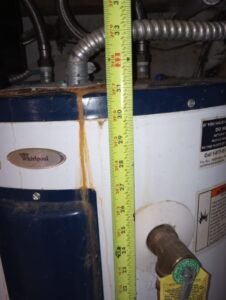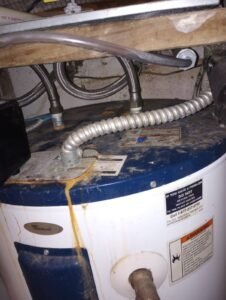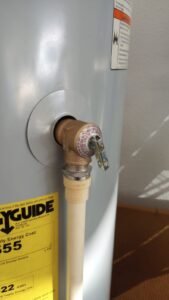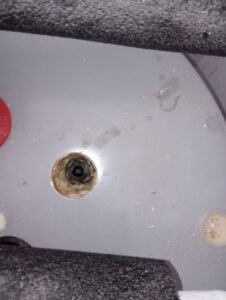7 Essential Water Heater Maintenance Hacks by Plumbing Therapist
Your water heater is a workhorse in your home, tirelessly heating water for your daily needs. However, like any appliance, it requires regular care to perform at its best. Neglecting water heater maintenance can lead to inefficiency, costly repairs, or even premature replacement.
At Plumbing Therapist, we’re passionate about helping homeowners in the Tampa Bay area enjoy the benefits of a well-maintained water heater. That’s why we’ve put together this comprehensive guide to walk you through the ins and outs of water heater maintenance. With our expert tips and insights, you can keep your water heater running smoothly and efficiently.
About Plumbing Therapist
Plumbing Therapist is your trusted local plumbing company serving the Tampa Bay area. With years of experience, we specialize in residential and light commercial plumbing services, including water heater maintenance, repair, and installation. We take pride in providing top-notch service to ensure your plumbing systems are in the best possible condition.
In the following sections, we’ll delve into the details of water heater maintenance, covering different types of water heaters, a maintenance checklist, the benefits of regular maintenance, when to call professionals, common issues, and tips for choosing the right water heater for your home.
Types of Water Heaters
Your first step in effective water heater maintenance is understanding the type of water heater you have. There are several types commonly found in homes:
Tank Water Heaters: These are the most common types of water heaters. They store and heat water in a tank, typically powered by electricity, natural gas, or propane. Tank water heaters come in various sizes to accommodate different household needs.
Tankless Water Heaters: Tankless water heaters, or on-demand water heaters, heat water directly as it flows through the unit. They are known for their energy efficiency and continuous hot water supply.
Heat Pump Water Heaters: Heat pump water heaters use electricity to move heat from the air or ground to heat water. They are highly energy-efficient but may not be suitable for all climates.
Solar Water Heaters: Solar water heaters use energy from the sun to heat water. They are environmentally friendly and can lead to significant energy savings over time.
Hybrid Water Heaters: Hybrid water heaters combine the features of tank and tankless models, offering energy efficiency and the convenience of a tank.
Condensing Water Heaters: Condensing water heaters are highly efficient and use the heat from exhaust gases to heat water.
Identifying your water heater type is essential because different types may require slightly different maintenance procedures. Once you know your water heater type, you can perform the appropriate water heater maintenance steps.
The Water Heater Maintenance Checklist
Now that you’ve identified your water heater type, let’s dive into the essential maintenance checklist that will keep your unit operating at its best. This checklist applies to most types of water heaters but may require slight adjustments based on your specific model.
1. Regular Visual Inspections:
Begin your water heater maintenance routine with visual inspections. Look for any signs of trouble, such as leaks, corrosion, or unusual noises. If you notice any issues, take note of them and address them promptly.
2. Testing the Pressure Relief Valve:
The pressure relief valve is a crucial safety feature that prevents excessive pressure buildup inside the tank. To test it:
- Turn off the power supply or gas to the water heater.
- Locate the pressure relief valve near the top of the tank.
- Place a bucket or container beneath the valve.
- Lift the valve’s lever, allowing some water to discharge into the bucket.
- The valve should snap back into place when you release the lever.
If the valve doesn’t release water or continues to leak after testing, it may be faulty and should be replaced.
Over time, sediment can accumulate at the bottom of the tank, reducing your water heater’s efficiency. Flushing the tank annually is essential to remove this sediment. Here’s how you should flush the tank for effective water heater maintenance:
- Turn off the power supply or gas to the water heater.
- Connect a hose to the drain valve located near the bottom of the tank.
- Place the other end of the hose in a suitable drainage location, such as a floor drain or outside.
- Open a hot water tap in your home to allow air into the tank, aiding in draining.
- Open the drain valve and let the water and sediment flow out.
- Close the drain valve when the water runs clear.
This process helps maintain your water heater’s efficiency and prolong its lifespan.
5. Checking the Anode Rod:
The anode rod is a sacrificial component that prevents corrosion inside the tank. Over time, the rod can become corroded, and checking it regularly is essential for water heater maintenance. To inspect the anode rod:
- Turn off the power supply or gas to the water heater.
- Locate the anode rod access point on top of the tank.
- Use a wrench to unscrew the access point cap.
- Inspect the anode rod for corrosion or signs of wear.
If the rod is significantly corroded, it should be replaced to ensure the tank remains protected.
6. Insulating Hot Water Pipes:
Insulating the hot water pipes connected to your water heater can help reduce heat loss. This ensures that hot water reaches your taps more quickly, saving energy and water. You can use foam pipe insulation or insulating tape to cover exposed pipes.
7. Adjusting the Temperature:
Check the temperature setting on your water heater. Most experts recommend setting it to around 120°F (49°C). This temperature not only prevents scalding but also saves energy by avoiding overheating.
By following this maintenance checklist, you can ensure your water heater operates efficiently and lasts for years without major issues. However, while some of these tasks can be done by homeowners, there are instances where professional water heater maintenance is necessary.

How often water heater maintenance should be done?
Water heater maintenance frequency can vary based on the type of water heater, the quality of the water in your area, and the manufacturer’s recommendations. However, here’s a general guideline:
1. Flushing:
- Tank-Type Water Heaters: For homes with hard water or high mineral content, it’s recommended to flush the tank once a year. If you have soft water, every 1-3 years might suffice. Regular flushing helps to remove sediment and prolongs the life of the heater.
- Tankless Water Heaters: These should be flushed annually, especially in areas with hard water, to prevent mineral buildup.
2. Inspection:
- Tank-Type Water Heaters: It’s a good practice to inspect the pressure relief valve and the anode rod annually. The anode rod helps prevent rusting inside the tank and typically needs replacement every 3-5 years, but this can vary based on the water quality.
- Tankless Water Heaters: Yearly inspections are also recommended. Look for any error codes on the unit, and ensure that the air intake and exhaust are clear of obstructions.
3. Temperature & Pressure Relief Valve (T&P Valve): Check the T&P valve annually. Lift or push down on the handle to ensure it operates freely. If water doesn’t flow out or it drips after testing, it may need replacement.
4. General Visual Inspection: Every few months, do a quick visual inspection for any signs of leaks, rust, or other obvious issues.
5. Filter Check (For Tankless Units): Some tankless water heaters have in-line filters that trap sediment before it enters the unit. Check and clean these filters every 6 months to a year.
6. Thermostat Check: Ensure that the thermostat is set at a safe and efficient temperature. 120°F (49°C) is typically recommended for most households.
What happens if I don’t flush my water heater?
If you don’t flush your water heater regularly, several potential issues can arise:
- Sediment Buildup: Over time, minerals like calcium and magnesium can precipitate out of the water and settle at the bottom of the tank. This sediment can accumulate and reduce the efficiency of the heater.
- Reduced Efficiency: Sediment acts as an insulator between the burner and the water in the tank. This means the burner must work harder and longer to heat the water, leading to higher energy consumption and costs.
- Shortened Lifespan: The increased workload on the water heater due to sediment buildup can lead to overheating and cause the tank to deteriorate faster. The metal can become weakened, leading to leaks or even ruptures over time.
- Noisy Operation: As sediment builds up, you might hear rumbling, popping, or crackling sounds coming from the heater when it’s heating up. This noise is created when water trapped under the sediment layer turns into steam.
- Discolored Water: If the sediment gets stirred up, it can result in rusty or muddy-looking hot water.
- Potential for Clogs: Sediment can sometimes make its way into the water lines, leading to reduced water flow or clogs in fixtures or valves.
- Decreased Hot Water Supply: As sediment builds up, it takes up space in the tank, reducing the amount of hot water that the tank can hold.
To avoid these issues, it’s advisable to flush your water heater periodically. The frequency will depend on your water source and the quality of your water. In areas with hard water, more frequent flushing might be necessary. Regular maintenance, including flushing the water heater, is essential to ensure the unit’s longevity and efficient operation.
How often should you drain a water heater?
Water heater maintenance, including draining the tank, is crucial for its performance and longevity. How often you should drain a water heater depends on factors like water quality and usage. However, a general recommendation is to perform this maintenance task annually. By draining the water heater annually, you can remove sediment buildup at the bottom of the tank, which can affect efficiency and potentially lead to costly repairs.
Regular water heater maintenance, such as draining the tank, is essential to ensure your unit operates efficiently and has an extended lifespan. Neglecting this task can result in reduced performance, higher energy bills, and even the need for a premature replacement.
In summary, make water heater maintenance, including draining, an annual part of your household routine to keep your unit in excellent working condition.
Benefits of Regular Water Heater Maintenance
Regular water heater maintenance offers numerous benefits, making it a worthwhile investment of your time and effort:
Improved Efficiency: A well-maintained water heater operates more efficiently, which means it consumes less energy to heat water. This translates to lower utility bills and reduced energy consumption.
Prolonged Lifespan: Proper water heater maintenance can extend the lifespan of your water heater. A well-cared-for unit is less likely to develop major issues or require premature replacement.
Cost Savings: By addressing water heater maintenance, you can prevent costly repairs or the need for a new water heater. It’s more cost-effective to maintain your existing unit than to replace it prematurely.
Enhanced Safety: Regular maintenance helps identify and address safety concerns. For example, a malfunctioning pressure relief valve or a leaking tank can pose safety hazards if left unattended.
Additional Benefits of Water Heater Maintenance:
Water heater maintenance, including draining the tank, is a critical aspect of ensuring your water heating system functions efficiently and has a prolonged lifespan. The frequency at which you should perform this essential water heater maintenance task can vary depending on factors such as water quality and usage patterns. However, as a general guideline, it is recommended to schedule water heater maintenance, which includes draining the tank, on an annual basis.
Water Heater Maintenance Importance: Regular water heater maintenance is vital because it helps address common issues that can arise in these appliances over time. The primary goal of draining the tank during maintenance is to eliminate sediment buildup. Sediment consists of minerals and debris present in your water supply. Over time, these particles settle at the bottom of the tank, forming a layer of sediment.
The Role of Sediment in Water Heaters: Sediment buildup is problematic for several reasons. Firstly, it acts as an insulator, making it harder for the heating element to transfer heat to the water. This means your water heater has to work harder and longer to heat the same amount of water, resulting in increased energy consumption and higher utility bills. Secondly, sediment can cause overheating, which may lead to damage to the tank or other components.
How Water Heater Maintenance Mitigates Issues: By incorporating regular water heater maintenance into your household routine, you can effectively address sediment buildup. During the draining process, you allow the accumulated sediment to be flushed out of the tank, restoring its efficiency. This simple yet effective maintenance task not only enhances the unit’s performance but also prolongs its lifespan, ultimately saving you money in the long run.
DIY vs. Professional Maintenance
Now that you’re familiar with the maintenance tasks, you might wonder which ones you can tackle yourself and when it’s best to call in the professionals at Plumbing Therapist.
What You Can Do Yourself:
- Regular visual inspections: Look for obvious issues like leaks, corrosion, or strange noises. If you spot anything concerning, note it down for further investigation or professional assessment.
- Adjusting the temperature: You can easily adjust the thermostat on your water heater to the recommended temperature of around 120°F (49°C).
- Insulating hot water pipes: Purchase foam pipe insulation or insulating tape from your local hardware store and apply it to exposed hot water pipes.
When to Call in the Pros:
While some maintenance tasks are DIY-friendly, there are instances where professional assistance is crucial:
- Testing the pressure relief valve requires turning off the power supply or gas and dealing with potentially scalding hot water. If you’re not comfortable or experienced with this procedure, leave it to the professionals.
- Flushing the tank: Flushing the tank involves turning off the power or gas, connecting a hose, and dealing with hot water and sediment. It’s a task best left to experienced technicians.
- Checking the anode rod: Accessing and inspecting the anode rod may require specific tools and expertise. If the rod needs replacement, a professional can handle it safely and efficiently.
By understanding your comfort level and capabilities, you can decide which maintenance tasks to handle on your own and when it’s wise to call Plumbing Therapist for assistance.

Common Water Heater Issues and Solutions
Even with regular maintenance, water heaters can encounter issues. Here are some common problems and their solutions:
Rusty Water: If you notice rusty water coming from your taps, it could be a sign of corrosion inside the tank. Rusty water typically indicates that the anode rod needs replacement. A Plumbing Therapist technician can assess the situation and replace the rod if necessary.
Strange Noises: Unusual noises, such as popping or rumbling sounds, may result from sediment buildup at the bottom of the tank. Flushing the tank, as described in the maintenance checklist, can often resolve this issue.
Leaks and Drips: Leaks and drips around your water heater can indicate a variety of issues, from a faulty pressure relief valve to a leaking tank. If you spot leaks, contact Plumbing Therapist for a thorough inspection and timely repairs.
No Hot Water: If you suddenly have no hot water, it could be due to a malfunctioning heating element, a tripped circuit breaker, or a gas supply issue. Professional troubleshooting can identify the root cause and the necessary repairs.
Choosing the Right Water Heater for Your Home
While maintenance plays a crucial role in the longevity and efficiency of your water heater, selecting the right unit in the first place is equally important. Here are some factors to consider when choosing a water heater for your home:
Factors to Consider:
- Fuel Type: Determine whether you want an electric, natural gas, propane, or solar-powered water heater. Your choice may depend on existing utility connections and environmental considerations.
- Capacity: Consider the size of your household and the peak demand for hot water. Choose a tank size or tankless unit that can meet your family’s needs.
- Energy Efficiency: Look for Energy Star-rated water heaters that meet energy efficiency standards. These units can save you money on your energy bills.
- Space and Installation: Ensure you have adequate space for the water heater you choose. Tankless models, for example, require less space and offer installation flexibility.
- Cost: Balance your budget with the long-term savings potential of energy-efficient models.
Energy-Efficient Options:
For homeowners looking to maximize energy savings, consider the following energy-efficient options:
- Tankless Water Heaters: These units only heat water when needed, eliminating standby heat loss.
- Heat Pump Water Heaters: They use electricity to transfer heat from the air or ground to heat water efficiently.
- Solar Water Heaters: Harness the power of the sun to heat water, providing long-term savings and environmental benefits.
When choosing a new water heater, consult with Plumbing Therapist to ensure you select the right unit for your home’s specific needs and budget.
Final Thoughts on Water Heater Maintenance: Insights from the Plumbing Therapist
In conclusion, maintaining your water heater is essential for its efficiency, longevity, and comfort. By following the maintenance checklist provided in this guide and knowing when to seek professional assistance, you can keep your water heater running smoothly.
Plumbing Therapist is your trusted partner for water heater maintenance, repair, and installation in the Tampa Bay area. Our experienced technicians are here to ensure your water heater performs optimally and reliably, giving you hot water whenever you need it.
Don’t wait until your water heater develops major issues. Start a regular maintenance routine today, and contact Plumbing Therapist for all your water heater needs. With our expertise and commitment to service excellence, you can enjoy the benefits of a well-maintained water heater for years to come.
If you have any questions, need assistance, or want to schedule a maintenance appointment, feel free to reach out to us. We’re here to serve you and keep your water heater in top condition.
Thank you for choosing Plumbing Therapist, your trusted plumbing expert in the Tampa Bay area!


